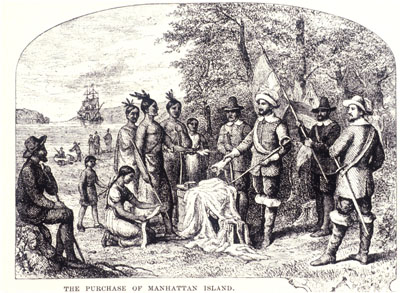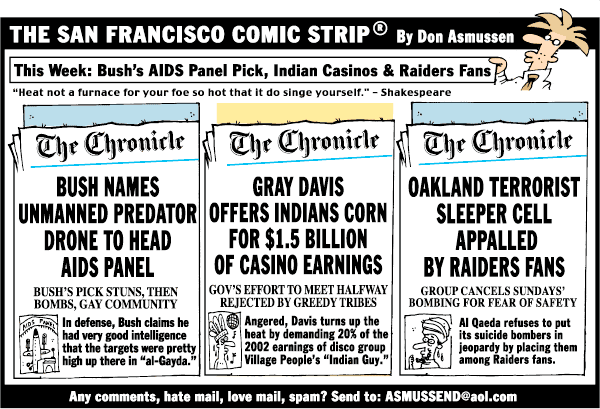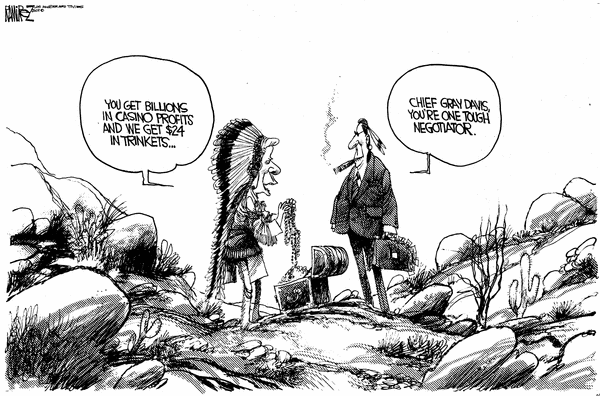 Another Stereotype of the Month entry:
Another Stereotype of the Month entry:
 Another Stereotype of the Month entry:
Another Stereotype of the Month entry:
From the Louisiana Weekly:
Louisiana sold for a string of beads
By Christopher Tidmore, Political Reporter
01-05-04
The Bush Administration had a Christmas Eve surprise for Mike Foster, one that could confirm the outgoing governor's legacy as the best friend that the gambling industry ever had. The Federal Bureau of Indian Affairs (BIA) gave its approval to allow the Jena Band of Choctaw Indians build a full casino in Logansport.
In the process, the BIA has established the precedent that an Indiana tribe need not have a reservation or a historical claim to a piece of land. The ruling effectively allows any Native American group to build a casino on virtually any given piece of property. And, they get to operate it tax-free.
Under Federal Law, Indian "reservations," both the real and imagined sort, exist outside the regulatory or taxable authority of the states. Therefore, in theory, Louisiana cannot demand one dollar in tax revenue from the proposed casino (once it's established). It made little difference to the BIA that that decision might affect the existing casinos in nearby Shreveport and Bossier City, nor that the tax-free status of the Jena facility might present an unreasonable competitive advantage to the riverboats with their 21.5% state tax rate.
It made little difference to the Bureau of Indian Affairs that its regulators previously rejected an agreement for a Lake Charles-area casino in which the Jena Band agreed to pay 21.5 percent of the casino's net revenues. Whereas that case affected the economy of the nearby cities, so said the Bureau, a tax-free facility is in the best interest of both the tribe and is in no way detrimental to "the surrounding community," in the BIA's opinion. Yet, curiously BIA only defines the "community" as DeSoto Parish — as if the other parishes did not exist.
The law requires, before the casino can open, that the governor give his written approval to the project. Given that the casino would likely have a deleterious effect on the local economy and would provide a net loss in tax revenue, of course, Mike Foster is in favor of the casino.
"It's no secret that we have been negotiating on this for weeks," Foster told the Shreveport Times. At first, the governor said he would sign an agreement if the tribe would agree to pay the state enough money that it would not be harmed by any loss of taxes from the Caddo-Bossier commercial casinos.
But, then he admitted that the problem was the Jena Indians "have not been able to come up with a number," and all but disregard money as a real concern.
This is the first step in a careful dance that Foster has perfected. It is performed to the score of "How to Succeed in (Gambling) Business, Without Really Trying." (Tommy Tune is to direct!)
It is a carefully crafted performance, after all. It began with the governor stating publicly that he was bound by law to enter into an "off reservation" contract with the tribe. When a reporter from the Lake Charles American Press pointed out that he was not legally so bound, the governor changed his story.
After confronted with the fact that "off reservation" gaming requires and does not mandate consent, he skillfully flip-flopped. In statements in March, Foster revealed that his true motivation was to enter into a contract because the next governor might disagree with his position and not allow the Logansport Casino. Only, the BIA took so long to give its approval, Foster must act within the next two weeks, or it will fall under the purview of Gov. Blanco.
The governor-elect said during the campaign that she worried about the harmful effect on Shreveport-Bossier City tourism if the tribe builds a casino in nearby Logansport. Even Foster admitted to the Times that he has "made one set of promises and she has made another set."
What will Governor Foster do? One clue comes from comments made by Patrick Martin V, the governor's assistant executive counsel who has negotiated with the tribe. Martin has spent months trying to hammer out a compromise. Despite attempting to find common ground, Martin echoes the governor when he said, "Not all business at a new casino necessarily comes from existing casinos...There is one study that predicts that only about half the Jena Band customers would be taken from the Shreveport-Bossier casinos. And any time you add a new gambling venue, you add to the market, you don't take it away from existing venues."
In other words, Martin is attempting to lay the proverbial groundwork by stating that the casino would pose no economic liability.
He said, "The Jena Band are entitled to a casino under the federal law...We know there will eventually be a Jena Band casino somewhere in Louisiana."
Martin paints a fait accompli, yet Foster could easily tell the Indians no, with no repercussions. Approving the casino is at the governor's discretion, a fact rarely emphasized by his staff.
Nor would the loss in revenue be made up dollar for dollar. Jena Band Chief Christine Norris admitted as much. In comments to the press, she said the tribe still refuses to pay taxes in the same way as the other casinos.
"We would like to give him what he wants ...but there will have to be some giving and taking," she said.
What "giving and taking?" Martin prepared the public for quite a bit.
He told the Times, "The difficulty in that is the federal government puts a limit on how much we can charge the tribe."

However, if the casino can only come into existence at the governor's pleasure, why cannot the state mandate the amount (or percentage) the casino operators must pay in advance?
Martin is quite correct. The state cannot tax the Indians by legislative action after it is approved, but Foster could contractually demand 21.5% — or more — as a term of his approval. Yet, the administration denies it has this power. No one seems to want to explain why it does not, though.
This is only the latest bit of sophistry that the Foster Administration has allowed to occur in the Jena Indian controversy. For example, the B.I.A. locally published and made available an Environmental Assessment Study of the casino, commissioned by the Tribe. Its purpose was to inform the public of the details and impact of the project.
However, their study was available for review and public input only until December 5. The 455-page document consisted of one copy available at each of the Logansport and Mansfield libraries respectively. To read the document, an interested party had only two options. He could sit at a table and read the near 500 pages in the library, or he could manually use the library copy machines at 15 cents per page.
That's not all. The machines at the libraries are older, and it takes between one and two hours of constant copying to reproduce the entire assessment. By arbitrarily ending the review period by Dec. 5 and putting the added hurdles on obtaining the information, few people had a chance to question the BIA's analysis, or question the justifications of the pro-casino assertions of the Foster Administration. Why no one just put the document on the Internet in PDF form remains a mystery, unless the objective was to keep as few critical eyes on the document as possible.
Nevertheless, this is open government when contrasted with the method by which the De Soto Police Jury passed their resolution approving the Tribal Casino. It was a narrow vote, 6 to 5. That was a majority, if not exactly a mandate, yet the curious factor is that the Police Jurors would not allow a parish-wide popular vote on the issue.
In 1996, the five Red River casinos had to survive a referendum to continue operations. This was done at the demand of the Foster Administration. Mike Foster said that the citizens of a parish or area should decide in local option if they desired casino gambling. However, the once pro-public governor made not a peep of protest when the De Soto Police Jury overruled critics who desired the same thing. Foster has refused to hold off his decision for a public referendum. Why would he do so, if he were not afraid that the citizens of De Soto Parish could decide against the proposed casino?
Elsewhere, Foster has claimed as one of his greatest legislative victories the safeguards that the Louisiana Gambling Act has to regulate the gambling industry. Normal riverboat casinos, race tracks, and Harrah's in New Orleans must have their employees, vendors, and contractors licensed and subject to background checks. These land and license owners are held to similar checks. Accounting procedures are monitored by the state daily. The number of gaming positions is capped. The State Police are regularly present.
In this case, though, Gov. Foster has not even worried that Indian gambling is totally unregulated. The so-called "reform" governor has expressed not one word of concern that tribal casinos are self-regulated without any state controls. Has the good governor expressed worry that without these statutory and regulatory safeguards, the integrity of Indian gambling operations can be severely compromised — and the state doesn't have any recourse? Of course not.
Has any member of the governor's staff questioned who are the primary financial beneficiaries of the proposed DeSoto Casino? Is it the Indian tribe or are the Jena Band just a front for gambling interests seeking to operate unregulated casinos tax-free?
Lastly, has Foster even responded to Rep. Patrick Flavin's proposal? The Lake Charles representative authored a bill that would require legislative approval of tribal compacts. The nature of legislative districts in theory enables more knowledgeable input on state issues that affect local areas. Local delegations have more regional knowledge about issues concerning their respective districts and deserve input.
That's at least what Mike Foster has often said he believes. The governor, who announces with pride that rarely bucks the will of the Legislature, refuses to even discuss the topic with Flavin.
Jim McCrery, the congressman from Northwest Louisiana, has urged Foster not to make a midnight decision, but he holds little hope that the governor will stay his hand.
"I would urge him to leave this to the next governor in whose hands the state is going to be held for the next four years...She has an interest in determining whether this is going to be in the best interests of the state...But he and I have disagreed over this so I would doubt he will take my advice," McCrery told his local newspaper.
From NOLA.com:
Foster won't sign agreement for DeSoto Parish Indian casino
The Associated Press
1/6/04 8:16 PM
NEW ORLEANS (AP) — In a closely watched decision with major economic implications for North Louisiana, Gov. Mike Foster said Tuesday he will leave office without allowing the Jena Choctaw band of Indians to build a casino in Logansport.
In his final days in office, Foster and his lawyers have been intensively negotiating with the Jena Choctaws to work out an agreement. The proposal under discussion has ignited controversy because it involved a novel move to casino-friendly territory by the tribe, far from its ancestral homeland.
In addition, the governor and others feared that an Indian casino, which is not required to pay taxes, would have hurt gambling in the Shreveport-Bossier City area, depriving the state of millions in tax revenue.
But late Tuesday Foster, in a news release, said there is too little time to work out an agreement. "I will leave all decisions regarding these complex issues for the new administration to consider," he said, referring to Gov.-elect Kathleen Blanco, who takes office Jan. 12.
Blanco said she supported Foster's decision, but would let her legal counsel review the issue before making any final determination.

Rob's comment
Some comments on Tidmore's screed:
>> Louisiana sold to Indians for a string of beads <<
That Indians sold their land and other possessions for beads is a stereotype. It implies the Indians were stupid rather than shrewd negotiators.
With this article title, Tidmore is saying today's Louisianans are as foolish as yesterday's Indians. Since he thinks his fellow Louisianans are making a big mistake, he's indicting the intelligence of Indians also.
Actually, the whole story of the Indians selling Manhattan to Peter Minuit for beads worth $24, from whence this stereotype came, may be false. According to one source, the Indians doing the selling didn't own the rights to the land. It's possible they cleverly swindled Minuit and got his trinkets for nothing.
>> The ruling effectively allows any Native American group to build a casino on virtually any given piece of property. <<
This is a ridiculous overstatement of the facts. A tribe can take land into trust only if the land is in its historic range. A Native group like California's Chumash can't build a casino outside Southern California any more than the KKK or the Boy Scouts can.
>> Under Federal Law, Indian "reservations," both the real and imagined sort, exist outside the regulatory or taxable authority of the states. <<
Needless to say, there are no such things as "imagined" reservations.
Indians aren't claiming they've found reservations that only they can perceive. They're taking land into trust, a different process than establishing a reservation. The land-into-trust process exists because white people stole millions of square miles of land from the Indians. This lets them retrieve a small portion of the land that was originally theirs.
>> Given that the casino would likely have a deleterious effect on the local economy and would provide a net loss in tax revenue, of course, Mike Foster is in favor of the casino. <<
If the Jena Choctaws' casino had a deleterious effect on the economy, it would be one of the few Indian casinos that did. Most reports show Indian casinos having a markedly positive effect on local economies. They may cause quality-of-life problems, but the economic benefits are
>> In other words, Martin is attempting to lay the proverbial groundwork by stating that the casino would pose no economic liability. >>
In other words, the casino actually wouldn't pose any economic liability, according to the best evidence available, and Tidmore can't accept the facts.
Shocker: Tribe refuses to pay taxes!
>> In comments to the press, she said the tribe still refuses to pay taxes in the same way as the other casinos. <<
And rightly so, since states can't tax tribal casinos. Martin is properly standing up for the concept of tribal sovereignty.
>> In this case, though, Gov. Foster has not even worried that Indian gambling is totally unregulated. The so-called "reform" governor has expressed not one word of concern that tribal casinos are self-regulated without any state controls. <<
Here Tidmore contradicts himself. "Self-regulated" isn't "totally unregulated." More important, all casinos are regulated at the federal level and most or all are regulated at the state level. That's three levels of regulation, not none.
>> Has the good governor expressed worry that without these statutory and regulatory safeguards, the integrity of Indian gambling operations can be severely compromised — and the state doesn't have any recourse? <<
The integrity of Indian gambling operations hasn't been compromised yet, so the existing regulatory scheme must be doing its job.
Maybe Foster didn't express open concern because he was quietly negotiating the issue. Really, this whole article is overblown.
>> Has any member of the governor's staff questioned who are the primary financial beneficiaries of the proposed DeSoto Casino? Is it the Indian tribe or are the Jena Band just a front for gambling interests seeking to operate unregulated casinos tax-free? <<
The Indian Gaming Regulatory Act mandates that tribes be the primary beneficiaries of the casinos they run. Tribes don't bring in outside partners because they're foolish—giving away their business like the Indians gave away Manhattan. They bring partners in because they need help with the complex and expensive job of launching a multimillion-dollar enterprise.
Despite Tidmore's scare tactics, Gov. Foster didn't "give away the store" or even sign a compact. He didn't confirm himself as the Choctaws' best friend or reap any benefit from the negotiations. So another example of Indians who are too powerful, who can buy whatever they want, bites the dust.
The land-into-trust process continues to work as it should. If the governor, who represents the people of the state, doesn't think a casino is a good idea, he or she can turn it down. That seems to be what incoming Gov. Blanco will do.
Related links
The facts about Indian gaming
|
. . . |

|
All material © copyright its original owners, except where noted.
Original text and pictures © copyright 2007 by Robert Schmidt.
Copyrighted material is posted under the Fair Use provision of the Copyright Act,
which allows copying for nonprofit educational uses including criticism and commentary.
Comments sent to the publisher become the property of Blue Corn Comics
and may be used in other postings without permission.